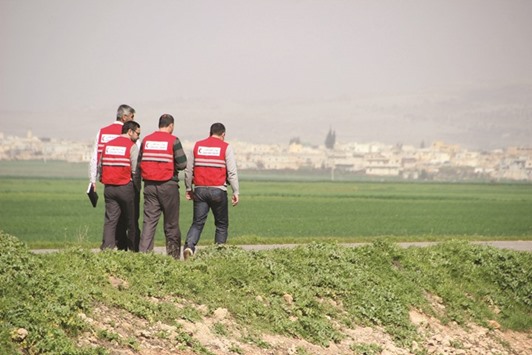Qatar Red Crescent Society (QRCS) has completed its wheat growing project this year in Syria, covering 2,340 hectares of agricultural land in six governorates.
The project aims to solve the problems faced by farmers in relation to securing agricultural input and marketing their production.
A total of 1,560 farmers benefited from this QRCS project, each cultivating around 1.5 hectares of land.
The distribution of cultivated lands included Aleppo (30%), Idlib (20%), Homs (15%), Hama (15%), Daraa (15%), and Rif Dimashq (5%).
QRCS has partnered with the General Organisation for Seed Multiplication and Al Sham Amana, a Syrian NGO, in implementing the project.
Five offices had been established and 20 agronomists were hired to supervise the implementation of the project in the six governorates.
At an overall cost of QR5,641,690, the crops had been harvested for June with an estimated production of 9,360 tonnes of wheat.
QRCS will buy 60% of the crops while the beneficiaries will retain 40%. Some portion of the wheat will be used in producing bread and another portion will be purified and re-sold to the farmers at minimal prices for the coming season.
A third portion will be used in expanding the targeted agricultural lands to preserve and restore the wheat species of Syria.
“This development project was launched in the 2014-2015 wheat crop season. It is designed to support the growing of wheat as an important crop,” QRCS executive director Fahad bin Mohamed al-Naimi said.
He noted that the project tries to increase the production of wheat to acceptable levels that can alleviate the everyday suffering of the Syrian people.
“They can no longer rely on the already insufficient assistance from the international community, which leaves Syrians idle and dependent on foreign aid,” al-Naimi added.
The project also aims to encourage farmers to cultivate their abandoned lands, increase wheat production in target regions as a strategic food item, create many work opportunities for jobless agricultural labourers, end wheat monopoly in farming areas, and lighten the burden on humanitarian organisations by shifting from relief to resource development.
“To ensure success, we co-ordinated closely with the other organisations supporting wheat crop farming to avoid duplication,” he said.
QRCS also provided the farmers with 585 tonnes of seeds and 585 tonnes of fertilisers.
“The results were marvellous and we are determined to go on with this noble humanitarian endeavour for the benefit of our Syrian brothers,” al-Naimi stressed, who also disclosed plans to establish a specialist centre for the restoration of wheat species of Syria.

QRCS closely co-ordinates with other organisations to support wheat farming in Syria.
